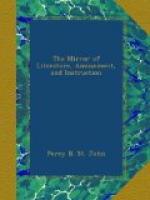or who might wish ill to the cause of the Reformation,
and take such means to scandalize it. London,
says Latimer, was never so full of ill; charity was
waxen cold in it. “Oh, London, London,”
cries this earnest old man, “repent! repent!
for I think God more displeased with London, than he
ever was with the city of Nebo."[9] Such was the profligacy
of its youth, that he marvels the earth gaped not
to swallow it up. There were many that denied
the immortality of the soul, and the existence of a
heaven or a hell.[10] Manly sports and pastimes had
been exchanged for the gaming-table. Divorces,
even amongst the inferior classes of society, were
become common; for marriage being declared no sacrament,
probably many chose to interpret the declaration to
mean that it was no bond.[11] The elementary bread
of the eucharist was expressed by base and indecent
nicknames.[12] The alehouses were filled with profane
disputants upon the mysteries of our faith, and the
dissolute scoffers made songs upon them:[13] “Green
Sleeves,” “Maggy Lauder,” and “John
Anderson my Jo,” with numbers more, were all
of this class of compositions; and psalms (in this
instance, perhaps, without any intentional levity)
were set to hornpipes. To crown all, a multitude
of disaffected persons were at large in the country,
speaking evil of dignities, and exciting the idle,
the hungry, and the aggrieved, to riot and rebellion;
bearding the government with audacious demands of
changes, both civil and ecclesiastical, to be made
at their pleasure, couched in language the most imperative
and insolent; “such,” Cranmer observes
in his answer to them, “as was not at any time
used of subjects to their prince since the beginning
of the world."[14]
[4] Some Account of Shrewsbury,
p. 128.
[5] See the Petition of the
Inhabitants of Holm Cultram, in
Cumberland,
to Cromwell, praying for the preservation of the
abbey
church there A.D. 1538. Ellis’s Original
Letters, ii. 89.
[6] Spelman, Hist. and Fate
of Sacrilege, p. 202. The extract is
from
a letter of John Bale to Leland.
[7] Homily on keeping clean
of Churches.
[8] Strype’s Cranmer,
177.
[9] Latimer’s Sermons, i.60,
61.—Id. i. 176.
[10] Id. i. 167.
[11] Latimer’s Sermons, i;
176, 220.
[12] Strype’s Cranmer, 175.
[13] Fox, 1048. Percy’s
Reliques of English Poetry, ii 291.
Shakspeare’s Winter’s Tale, act
iv. sc. 2.
[14] Strype, Append, 88.
Fox’s Book of Martyrs.
For a history of that noble army of martyrs of whom
it now becomes our business to speak, we are indebted
to John Fox, himself an exile in Mary’s reign,
and like most of those who then lived abroad, a friend
of the Puritan principles at home. He had access
to the archives and registers of the bishops; Grindal,
who was himself a great collector of such materials,
amongst others, supplying him with what he knew; and




